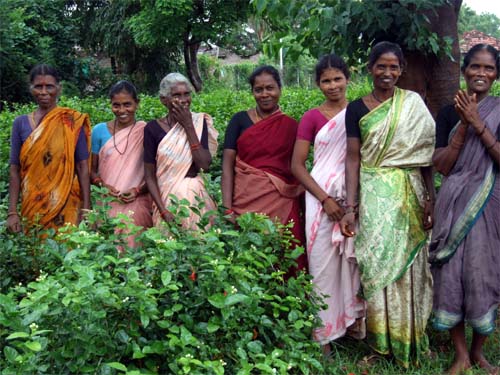Apr 14, 2025
Apr 14, 2025
by Usha Revelli
Mangi Lal, the Agriculture Extension Officer at Eturunagaram in Andhra Pradesh's Warangal district, is a happy man. He no longer has to go off to far-flung areas on educational field trips for the farmers in his area. He just brings them down to Nagastram, a six-acre garden in the picturesque tribal block, as part of their exposure visit to demonstrate best practices. This is a huge pat on the back for the women who have been responsible for transforming the land.

The Nagastram garden has been cultivated by 11 women - all widows aged between 30 and 60 and belonging to the Scheduled Tribes - on a commercial plot. They come under the purview of the Integrated Tribal Development Authority (ITDA), working under the Tribal Welfare Department of the state government.
Peddi Mallamma, Tammeda Sammakka, Idena Saramma, Peddi Sarada, Peddi Lakshmi, Mukkera Saramma, Ketha Lakshmi, Basa Rajyalakshmi, Ketha Ramakka, Basa Sarojana, and Aila Boyina Lakshmi got together and formed a self-help group (SGH) and transformed land that was previously used as a dumping yard.
The SHG put forth a proposal to the ITDA to take up the land for horticulture and floriculture and agreed to pay an annual lease. ITDA agreed and later even gave a contract to the women to build a fence around the sprawling garden. Incidentally, the women belonged to the same gram panchayat (village council) and were fairly familiar with one another. That they were all widows was a coincidence.
Before starting out on this venture, the women used to work as farm hands. But despite all the hard agricultural labour they put in, they often found it difficult to make ends meet, with the meagre Rs 30 a day (US$1=Rs40) - and sometimes just Rs 20 - earnings.
Today, with the help of a loan secured under the Community Investment Fund of the Indira Kranthi Patham poverty alleviation programme, they have managed to create a paradise for themselves. They had borrowed Rs 100,000 out of which Rs 60,000 has already been paid back.
"Now, we are self-reliant. We were workers, now we are farmers. This is our own cultivation, our own yield. Our position has changed," says Rajyalakshmi, the leader of the SHG and a mother of two.
"We have our vermicompost manure pit, we spray the pesticides by ourselves and we sell the produce in the market, for a little less than the other farmers,"
says Mukkera. With all their hard work paying off now, the garden has blossomed into a full-fledged source of income. Each of the women now earns an average of Rs 5,000 per month.
"There is a small ant-hill at the back of the garden that has snakes. The entire village performs 'puja' (religious ceremony) here and pours milk on Nagula Chaviti, an auspicious day earmarked to worshipping snakes. So, we decided to name it after the Snake god. It is called Nagastram Sangham, the weapon of snake god," Mallamma explains proudly. "No sangham has such a creative name."
When ITDA wanted the women to hike the lease amount, the women unequivocally told the officials "We have cleaned up your forest and are putting the land to use. What else do you need?" Yet, they agreed to hike the amount from Rs 5,000 to Rs 10,000, from this year.
In August 2005, when the River Godavari had flooded the area, the entire garden was submerged. The group had sought ex-gratia payment from ITDA but later settled for seeds to replant whatever was lost.
Those members, whose children are now grown up, stay within the premises of the garden, in the small cottage at the entrance. "There was a time when we guarded the mango trees in peak season by sleeping on racks tied to the tree branches. We could chase even a fat man to the end of the village," recalls Sammakka.
The women vouch by undying loyalty towards each other and unity. "If there is one lunch box, we share it and eat just a mouthful like 'prasadam' (religious offering, had in small portions) and be happy," says Sarojana proudly. They have daily meetings where they plan what needs to be planted and how to manage the garden. They assign themselves duties and discuss money.
The women have other plans too. "We want to buy buffaloes as the collector madam said she'd revive the milk collection centre. And we are also going to get chicks," Mallamma outlines.
When they weed the garden, they sing the Sita song, a song that tells the story of the 'Ramayana' (Hindu epic). But, here the chief protagonist is Sita and not Lord Ram. The lilting song echoes through the garden, as 10 voices follow one lead voice. The garden is dotted with bright colors, nylon saris fluttering in the wind. "Ramayana, as we see it, is a woman's story. So, it should be told from Sita's standpoint. Also, it helps that the story is long. We finish weeding by the time we finish the song," remarks Ketha Ramakka.
"Each one of us is a Sita. Our lives are troubled as was hers. We sing Sita's story to carry us through a day's toil."
For these Nagastram members, four years of toil has yielded sweet fruits.
Buyers are eager to purchase their produce that is largely free of pesticides and chemical fertilisers and is competitively priced.
Some of them such as Peddi Sarada and Ketha Lakshmi have even bought a house. Others have had theirs repaired. Their children now go to school and one of them, Saramma, had got her daughter married. In addition to the visible incomes, the women are secure with the knowledge that they have consistent work, all the year round.
23-Sep-2007
More by : Usha Revelli